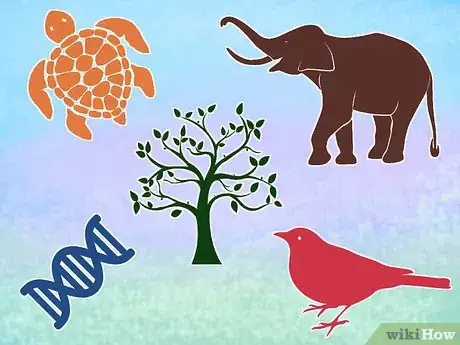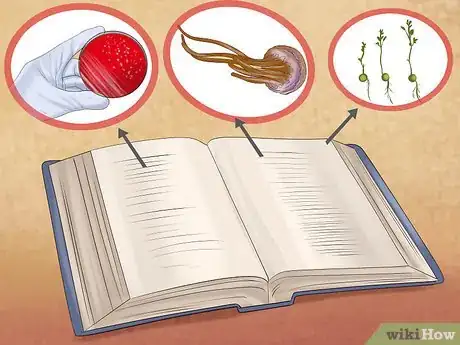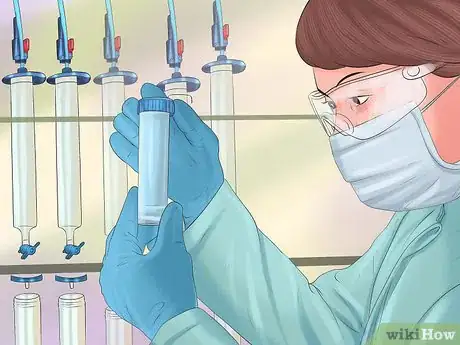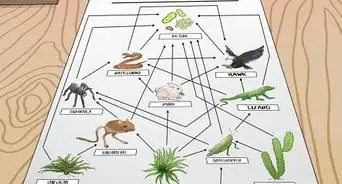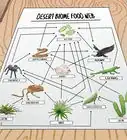This article was co-authored by wikiHow Staff. Our trained team of editors and researchers validate articles for accuracy and comprehensiveness. wikiHow's Content Management Team carefully monitors the work from our editorial staff to ensure that each article is backed by trusted research and meets our high quality standards.
There are 10 references cited in this article, which can be found at the bottom of the page.
wikiHow marks an article as reader-approved once it receives enough positive feedback. In this case, 89% of readers who voted found the article helpful, earning it our reader-approved status.
This article has been viewed 121,311 times.
Learn more...
Biologists study living organisms and how they relate to the environment. Colleges and universities, government agencies, pharmaceutical companies, conservation groups, and many other sites hire biologists. To work as a biologist, you usually have to get an advanced degree, acquire deep knowledge of a biological sub-field, and gain research experience.
Steps
Getting an Education
-
1Get an undergraduate (bachelor's) degree. Depending on the school you attend, you may be able to major in biology, or a more specific field such as zoology, botany, or microbiology.[1] Neither approach is necessarily better than the other; you can always choose an area of specialization later on in graduate school.
- Choose a school based on personal, financial, and social needs.
- Bachelor’s degrees typically take about 4 years to complete.
-
2Take science courses. Making sure to acquire a broad background knowledge in science is important to becoming a biologist. Aside from obvious courses in biology, biochemistry, and related subjects, it is useful to study subjects including.[2]
- Chemistry
- Physics
- Statistics
- Computer Science
Advertisement -
3Don’t neglect writing courses. Much work that biologists do involves reading and understanding the research publications of others, and writing articles.[3] Writing courses will help you hone your linguistic and research skills. You can seek out writing-intensive science courses, elect to write a senior thesis on a biological subject, or look for courses that will give you opportunities to write, including:
- English
- Comparative Literature
- History
- Philosophy
-
4Understand biological subfields. Terms like “biology” and “zoology” are general terms that refer to the scientific study of living organisms and their environments. There are many subfields of biology that study a specific section of the living world or a specific group of organisms.[4] [5] Most biologists develop expertise in one of these subfields. For example:
- Cell biology (also called molecular biology) studies organism function at the molecular and cellular level.[6]
- Ecology studies the nature, function, and development of whole ecosystems.[7]
- Wildlife biologists study animals within their environments or in relationship to humans.[8]
- Marine and freshwater aquatic biology studies water-based organisms and environments.[9]
- Marine mammal science studies organisms like whales, sea lions, and manatees.[10]
- Entomology studies insects, their development, roles in the environments, etc.
- Botany (also called plant biology or plant science) studies the nature of plants and their role in environments.
-
5Take courses in a specialization. As an undergraduate, you do not have to choose an area of specialization yet. However, if you are interested in a particular biological subfield, such as microbiology, marine biology, or botany, you can begin taking courses in that area.[11] As an undergraduate, however, you should concentrate on getting a good general science background.[12]
-
6Take part in undergraduate research or internships.[13] [14] Even as an undergraduate, there may be opportunities for you to participate in research. These can give you practical lab or field experience, a good sense of what life as a biologist is like, and a network of contacts.
- Ask professors at your school if there are opportunities for you to assist in lab work or research projects.
- See if there are special undergraduate research programs offered at your school, during the academic year or summer.
- Consider completing a senior thesis or capstone project that explores a topic in biology
- Seek volunteer, internship, or research opportunities at local labs, colleges and universities, hospitals, wildlife preserves, government agencies, etc.
- Talk to your advisor or a professor you know well if you want help finding research and internship opportunities.
-
7Choose potential graduate school programs and apply to them.[15] During your junior year of college, you should develop a list of potential graduate schools (with master’s and/or Ph.D programs in biology) that you would like to attend. During the first part of your senior year, you should apply to those schools.
- It is better to choose schools based on their strength in the area of biology you would like to study rather than their general reputation.
- Applications to graduate school usually require letters of recommendation from some of your former professors or lab supervisors, scores from the GRE (Graduate Record Exam), application essays, and other items.
- Some students choose to take one or more years off between undergraduate and graduate programs. If you take this approach, you can work in a lab, for a conservation agency, or in another position that will allow you to gain additional skills before applying to graduate school.
- Some students choose to get a master’s degree from one school before entering a Ph.D program in another. Other students earn a master’s degree from the same school that awards their Ph.D. Other programs allow students to earn a Ph.D without ever getting a master’s.
- The right choice of program for you depends upon your career plans. Research biologists are typically required to have a Ph.D, while master’s degrees may qualify you for some other positions, such as with conservation agencies.
-
8Complete a graduate program and earn your Ph.D.[16] Earning a Ph.D can take five or more years (potentially longer if you earn a master’s degree first). Graduate programs typically involve coursework, examinations, and extensive research leading to a dissertation project that contributes original knowledge to the field of biology. As a graduate student, you may also author or co-author original research articles.
- In many cases, you can receive funding for graduate school through teaching or research assistantships, scholarships, or work opportunities. Ask schools you are interested in applying to about how they fund their graduate students.
- If you are interested in working as a professor of biology at a college or university, it is important to get some teaching experience in addition to lab research experience.
- Some biologists seek postdoctoral programs (up to several years in length) after completing their graduate program. These can provide additional research and/or teaching experience.
Choosing an Employment Sector
-
1Work at a college or university. Biologists that work at colleges or universities may be employed as professors or research associates. Their day-to-day activities may involve teaching undergraduates and/or graduate students, performing original research, supervising the research of others, seeking grants from government, non-profit, and private sources, and serving on various educational committees.
- Some biologists may also teach in lower-level educational settings. However, a bachelor’s is ordinarily the highest degree required to teach biology in grade school.
- Jobs at colleges and universities are few in number and difficult to achieve. You can increase your chances of getting one by excelling in research, publications, and teaching.
-
2Work in a government agency. Governments hire biologists to conduct research, advise policy makers, manage protected environments, and other tasks. Biologists are employed in various government agencies, including[17]
-
3Work in private research. Private organizations hire biologists to work in areas such as biotechnology, food science, and pharmaceuticals.[20] These positions are concerned with finding practical solutions (applied research) to problems in medicine, society, or industry. They may seek, for example, to understand the causes of illnesses and diseases.[21]
-
4Work with non-profit organizations. Wildlife preserves, conservation agencies, science museums, nature centers and other organizations offer employment opportunities for biologists.[22] [23] [24] Scientists working for such organizations may help monitor and maintain species and environments, study wildlife, advise policy makers, write essays or journalism on science for the general public, and other tasks.
Community Q&A
-
QuestionWhat is a typical biologist's salary?
 Community AnswerA typical salary for a biologist can range from $41,230 to $127,120 depending how long you have been in the field of biology and/or the company you work for.
Community AnswerA typical salary for a biologist can range from $41,230 to $127,120 depending how long you have been in the field of biology and/or the company you work for. -
QuestionAre biologists similar to scientists?
 Community AnswerBiologists are scientists as biology is a form of science.
Community AnswerBiologists are scientists as biology is a form of science. -
QuestionWhat type of college degree do I need to get to become a field biologist?
 Community AnswerMost field biologist positions require a minimum undergraduate degree in biology or a related field. Some positions prefer or require a masters or other advanced degree.
Community AnswerMost field biologist positions require a minimum undergraduate degree in biology or a related field. Some positions prefer or require a masters or other advanced degree.
References
- ↑ http://www.flmnh.ufl.edu/fish/kids/biologist/bologist.htm
- ↑ http://www.sicb.org/careers/faqs.php3
- ↑ http://www.flmnh.ufl.edu/fish/kids/biologist/bologist.htm
- ↑ http://www.bls.gov/ooh/life-physical-and-social-science/microbiologists.htm#tab-2
- ↑ http://www.bls.gov/ooh/life-physical-and-social-science/zoologists-and-wildlife-biologists.htm#tab-2
- ↑ http://www.uww.edu/cls/biology
- ↑ http://www.uww.edu/cls/biology
- ↑ http://www.environmentalscience.org/career/wildlife-biologist
- ↑ http://www.uww.edu/cls/biology
- ↑ http://www.afsc.noaa.gov/nmml/education/science/mmcareers1.php
- ↑ http://www.flmnh.ufl.edu/fish/kids/biologist/bologist.htm
- ↑ http://www.sicb.org/careers/faqs.php3
- ↑ http://www.sicb.org/careers/faqs.php3
- ↑ http://www.aibs.org/careers/
- ↑ http://www.sicb.org/careers/faqs.php3
- ↑ http://www.sicb.org/careers/faqs.php3
- ↑ https://askabiologist.asu.edu/becoming-biologist
- ↑ http://www.sicb.org/careers/faqs.php3
- ↑ http://www.parkrangeredu.org/biological-science-technician-jobs/
- ↑ http://www.sicb.org/careers/faqs.php3
- ↑ http://www.aibs.org/careers/
- ↑ http://www.aibs.org/careers/
- ↑ https://askabiologist.asu.edu/becoming-biologist
- ↑ http://www.aibs.org/careers/
About This Article
As a biologist, you'll be studying living organisms and their environments while working for universities, the government, non-profits, or private companies. To help prepare you for the job, take a lot of science courses, like chemistry, biology, and physics. Although your focus should be on science, try to do well in your writing courses too, since biologists often write research papers and articles. You can also volunteer or intern at a local lab or wildlife preserve to help you gain first-hand experience in the field. To learn how to meet the educational requirements for being a biologist, keep reading!



